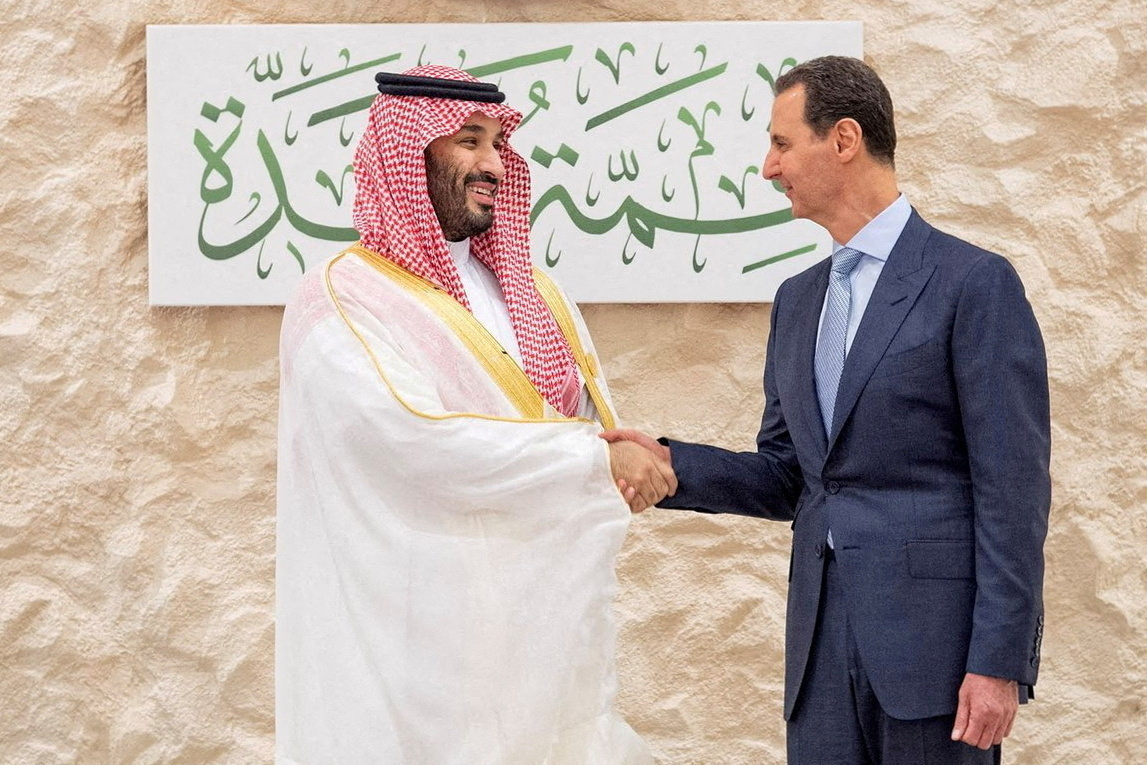
Riyadh (Reuters) – Once labelled a pariah, Saudi Crown Prince Mohammed bin Salman took centre stage as master of ceremonies last week when Arab states readmitted Syria to the Arab League, signaling to Washington who calls the regional shots.
His effusive greeting of President Bashar al-Assad at the Arab summit with kissed cheeks and a warm embrace defied U.S. disapproval at Syria’s return to the fold and capped a turnabout in the prince’s fortunes spurred by geopolitical realities.
The prince, known as MbS, seeks to reassert Saudi Arabia as a regional power by using his place atop an energy giant in an oil-dependent world consumed by the war in Ukraine.
Shunned by Western states after the 2018 killing of journalist Jamal Khashoggi by a Saudi hit squad, the prince has now emerged as a player whom Washington can neither disregard nor disavow, but must deal with on a transactional basis.
Skeptical of U.S. promises on Saudi security and tired of its scolding tone, MbS is instead building ties with other global powers and, regardless of Washington’s consternation, remaking his relations with their shared foes. His carefree confidence on the world stage wasn’t just reflected in his hospitality to President Assad. Ukrainian President Volodymyr Zelensky came to a meeting in Jeddah and MbS offered to mediate between Kyiv and fellow oil-producing Moscow.
But Saudi Arabia is still militarily dependent on the United States, and the United States, which was saved from a possible invasion of Iraq by Saddam Hussein in 1990, has been monitoring Iran’s military activities in the Gulf and keeping most of its weapons in Riyadh. is supplying
But with Washington appearing to be less involved in the Middle East and less receptive to Riyadh’s concerns, MbS is pursuing its own regional policy with less respect for the views of its most powerful allies.
Abdulaziz Al-Sagar, director of the Gulf Studies Center, said of the summit, “This is a strong signal to the United States that without you our relationship has been and is about to be rebuilt.” . “He’s not getting what he wants from the other side,” Sager added, saying that Saudi Arabia’s alliance with regional adversaries is based on Riyadh’s approach to regional security.
Diplomatic offensive
MbS’ position was strengthened last year when the West turned to Saudi Arabia to tame oil markets destabilized by the Ukraine war. This gave MbS an opportunity to launch a high-profile diplomatic offensive to the summit.
The effort was aided by Washington’s declaration that the US government was exonerated from prosecution for the assassination of Khashoggi, even though he was directly implicated by US intelligence services.
A visit by US President Joe Biden last July already showed Riyadh’s newfound influence.
US leaders returned home empty-handed, but the crown prince enjoyed publicly demonstrating US commitment to Saudi Arabia’s security. Meanwhile, Saudi Arabia’s shift away from US dependence was evident this year when China brokered a reconciliation between Riyadh and its arch-enemy Iran after years of hostilities.
This agreement was not concluded on behalf of Saudi Arabia.
Iran’s allies were stronger than Saudi Arabia in Iraq, Syria and Lebanon, and held most of Yemen’s settlements.
Still, it showed that Riyadh was able to contain losses and work with US rivals and adversaries to strengthen regional interests, including quelling the Yemeni war that has been bogged down by Saudi forces since 2015.
Meanwhile, the prince improved relations with Turkey and ended a boycott of neighboring Qatar, which he considered invading in 2017, according to diplomats and Doha officials.
Riyadh assumed that Washington would abandon old allies during the rebellion and possibly abandon the al-Saud dynasty as well. At the same time, the US push for a nuclear deal with Tehran is believed to have led Washington to ignore the growing Iranian proxy activity in the region, which Riyadh sees as a threat.
I got that impression. A Saudi source close to the ruling allies cited lax enforcement of sanctions against Iran and a disengagement in Syria, where a small US force has denied territory to Iranian allies.
“So I think countries in the region will do what is best for them,” he said. Riyadh, meanwhile, was furious that the US had ended its support for Saudi operations in Yemen after Washington repeatedly urged the Saudis to take responsibility for their security.
Without direct U.S. intervention and support for its own military efforts, Riyadh had little choice but to strike a deal with Iran even if it angered the U.S. government, the sources said.
“This is the result of US actions,” he added.
Gulf officials say each side has a list of requests the other is unwilling to comply with.
But both sides may have little choice but to put their grudges aside. Saudi Arabia sees the U.S. security umbrella as weakened, but still sees it as important to Saudi Arabia’s defense. Meanwhile, Western countries recall Riyadh’s grip on volatile oil markets and the need to set aside concerns and come to terms with the de facto ruler and future king.